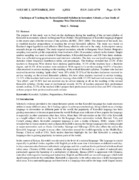| dc.description.abstract | The purpose of this study was to find out the challenges facing the teaching of the revised syllabus of
Kiswahili in secondary schools in Bungoma West District. The performance of Kiswahili language dropped
in the recent years after the revision of the syllabus, (KNEC, 2007, 2008). The objective of the study was
to establish teacher preparedness in teaching the revised Kiswahili syllabus. The study was based on
Krashen’s input hypothesis and affective filter theory which is relevant to the study. A descriptive survey
research design was adopted. The study targeted secondary schools in Bungoma West District. Purposive
sampling was used to get the respondents from 6 schools of the 18 secondary schools in the district. Simple
random sampling was used to select 6 Head teachers, 6 Kiswahili teachers and 300 form three students.
Data was collected using questionnaires and interview schedules. The data was analyzed using descriptive
statistics where frequency distribution tables and percentages. The findings revealed that 22.2% of the
teachers in Bungoma West district have diploma qualification, 33.3% of the teachers have a Bachelor
degree, and 44.4% of the teachers were untrained. With regard to in-service training 16.67% of teachers
often received in-service training on the teaching of the revised Kiswahili syllabus. Teachers who had not
received in-service training “quite often” were 50% while 33.33% of the teachers had never received inservice training on the revised Kiswahili syllabus. On how often teachers received in-service training,
11.11% of the teachers had received in service training often while 33.33% had received in service training
“less often”, and 55.56% had not received any in service training at all on the teaching of the revised
Kiswahili syllabus. On the issue of professional records, 16.7% of teachers prepared their professional
records on time, 33.3% of the teachers didn’t prepare their professional record on time and 50% of teachers
at times prepare their professional records on time. | en_US |

